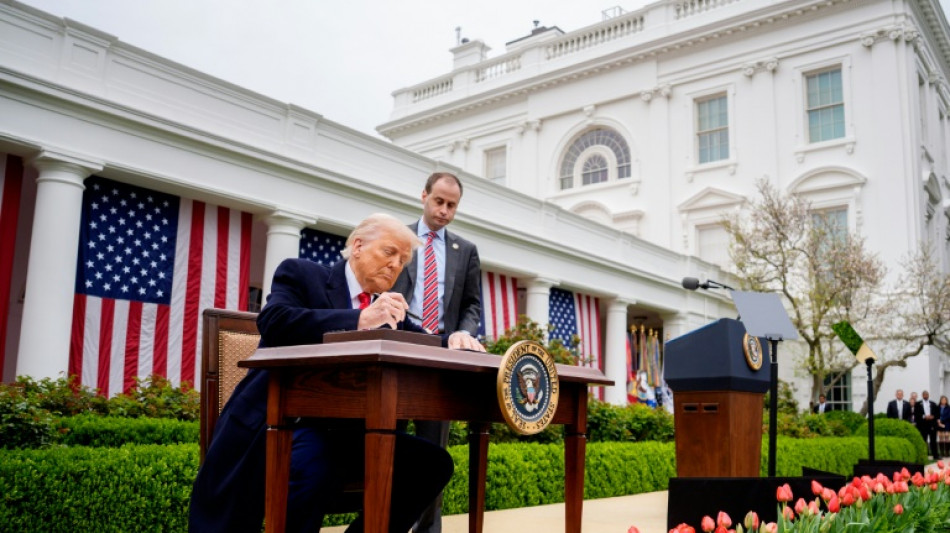
-
 Huthis report US strikes after Israel vows revenge for airport attack
Huthis report US strikes after Israel vows revenge for airport attack
-
South African men, New Zealand women win Rugby Sevens World Championships in LA

-
 Rufus Wainwright's 'Dream Requiem' explores catastrophe and redemption
Rufus Wainwright's 'Dream Requiem' explores catastrophe and redemption
-
Pacers shock Cavs in NBA playoff series opener

-
 'Sarcastic' Hamilton shows frustration as Ferrari struggle again
'Sarcastic' Hamilton shows frustration as Ferrari struggle again
-
Three in a row Piastri wins in Miami to lead McLaren one-two

-
 Scheffler ties 72-hole PGA record in CJ Cup Byron Nelson romp
Scheffler ties 72-hole PGA record in CJ Cup Byron Nelson romp
-
Nicaragua says quitting UNESCO over press prize award

-
 Oscar Piastri wins Miami Grand Prix to lead McLaren one-two
Oscar Piastri wins Miami Grand Prix to lead McLaren one-two
-
Bednarek runs this year's world-best 200m to win at Miami Grand Slam
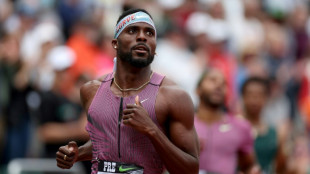
-
 'Lucky number seven' for Ruud after beating Draper to clinch Madrid Open
'Lucky number seven' for Ruud after beating Draper to clinch Madrid Open
-
China's Zhao leads Williams 11-6 in world snooker final

-
 Far-right candidate tops Romania's presidential rerun
Far-right candidate tops Romania's presidential rerun
-
Ryu takes wire-to-wire win at LPGA Black Desert Championship

-
 Marseille held by fellow Champions League hopefuls Lille
Marseille held by fellow Champions League hopefuls Lille
-
'Lonely' Palou cruises to win at IndyCar Alabama Grand Prix

-
 Zelensky says does 'not believe' Russian truce pledge
Zelensky says does 'not believe' Russian truce pledge
-
US Fed expected to pause rate cuts again, await clarity on tariffs
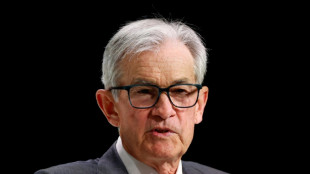
-
 Ruud beats Draper to win Madrid Open and claim maiden Masters
Ruud beats Draper to win Madrid Open and claim maiden Masters
-
Far-right candidate leads Romania's presidential rerun
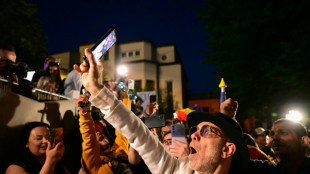
-
 Parag's six sixes in a row, Pant flops in IPL
Parag's six sixes in a row, Pant flops in IPL
-
Howe hails Newcastle's 'ruthless' Isak after VAR drama in Brighton draw

-
 Pant woes continue as Lucknow lose to Punjab in IPL
Pant woes continue as Lucknow lose to Punjab in IPL
-
'Thunderbolts' strikes big, topping N.America box office

-
 Kompany player-led shake-up returns Bayern to Bundesliga summit
Kompany player-led shake-up returns Bayern to Bundesliga summit
-
Leverkusen draw hands Kane's Bayern Bundesliga title

-
 Chelsea sink champions Liverpool, Man Utd crash at Brentford
Chelsea sink champions Liverpool, Man Utd crash at Brentford
-
Bielle-Biarrey lifts Bordeaux past Toulouse and into Champions Cup final

-
 Chelsea beat champions Liverpool to boost top five push
Chelsea beat champions Liverpool to boost top five push
-
Hammers' Potter reveals Paqueta's tears of frustration at Spurs draw

-
 Lyon's Champions League hopes hit by loss to Lens
Lyon's Champions League hopes hit by loss to Lens
-
Israel vows retaliation against Iran, Yemen's Huthis over airport attack

-
 Man Utd 'need to change' after Brentford loss: Amorim
Man Utd 'need to change' after Brentford loss: Amorim
-
China's Zhao dominates Williams 7-1 in first session of World Snooker final

-
 Zelensky says does 'not believe' Russian truce promises
Zelensky says does 'not believe' Russian truce promises
-
Bielle-Biarrey double lifts Bordeaux past champions Toulouse and into Champions Cup final

-
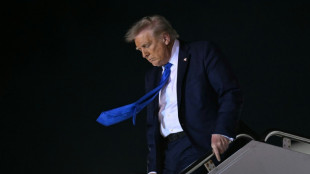 Trump says 'I don't know' if must uphold US Constitution as president
Trump says 'I don't know' if must uphold US Constitution as president
-
Brazil police foil Lady Gaga gig bomb plot

-
 Godolphin in full bloom as Desert Flower wins 1000 Guineas
Godolphin in full bloom as Desert Flower wins 1000 Guineas
-
Almeida wins Tour de Romandie as Evenepoel claims closing time-trial

-
 Bolsonaro leaves hospital three weeks after abdominal surgery
Bolsonaro leaves hospital three weeks after abdominal surgery
-
Man Utd crash at Brentford, Isak rescues Newcastle

-
 Romanians vote in tense presidential rerun as far right eyes win
Romanians vote in tense presidential rerun as far right eyes win
-
Lyon see off Racing to set up Challenge Cup final against Bath

-
 Kolkata survive Parag's six-hitting blitz to clinch IPL thriller
Kolkata survive Parag's six-hitting blitz to clinch IPL thriller
-
Israel vows retaliation against Yemen's Huthis over airport attack

-
 Mbappe maintains Real Madrid Liga dream in Celta thriller
Mbappe maintains Real Madrid Liga dream in Celta thriller
-
UNESCO says Nicaragua quitting over press prize award

-
 Church donation box goes digital in Greece
Church donation box goes digital in Greece
-
Germans mark liberation of Ravensbrueck Nazi camp


Trump tariffs to test resiliency of US consumers
In unveiling tariffs this week challenging the decades-old international trade order, President Donald Trump lambasted globalization as a raw deal for the United States that has devastated US manufacturing towns.
Trump left out the upside to the United States from the liberal flow of goods: a reliable supply of affordably priced appliances, clothing and electronics whose consumption has helped lift US economic growth above other developed economies in recent years.
"Obviously we've benefited significantly," said Paul Gruenwald, global chief economist at S&P Global Ratings. "We get to consume a lot of things that are produced more efficiently in other countries."
Trump's tariffs are almost certain to negatively impact this dynamic, say economists who see the levies lifting the price on everything from Gap t-shirts to the Apple iPhone to French wine.
"This is very clearly going to raise consumer prices," Michael Pearce, a US economist with Oxford Economics, said of the barrage of levies announced late Wednesday in an unveiling the White House billed as "liberation day."
Winners in Trump's policy include communities that benefit from reshored manufacturing, while losers include export-focused industries like plane manufacturing and pharmaceuticals if there are retaliatory tariffs, Pearce said.
But imports represent only about 14 percent of US gross domestic product, while exports account for 11 percent -- figures that are even lower if energy is taken out. Moreover, goods account for one-third of US consumption compared with services, which comprise the rest.
"The net impact on the US economy may be surprisingly small given the headlines we're seeing," said Pearce, who warned that Trump's levies could end up disproportionately hurting low-income consumers if the tariffs are paired with tax cuts that benefit the wealthy.
Gruenwald, who described US consumer resiliency as a core strength in recent times, said S&P will lower the US outlook somewhat amid a higher inflation outlook for 2025. But he said the trade war "wouldn't move the needle" in the short-term "for a big economy like the United States."
- More 'friction' ahead -
Trump's Wednesday White House event unveiled levies on dozens of countries including all major US trading partners. These included the imposition of 20 percent levies on the European Union, 24 percent on Japan and an additional 34 percent on goods from China -- bringing the new added tariff rate there to 54 percent.
Trump cast the event in historic terms, saying Wednesday "will forever be remembered as the day American industry was reborn" and the country turned the page on globalization.
"For decades, our country has been looted, pillaged, raped, and plundered by nations near and far, both friend and foe alike," he said.
A day after the announcement, commentators cautioned that the president's history of sometimes quickly shifting on tariffs meant that the proposed levies could be altered after bargaining with other governments, which could lean on big companies to lift investments in the United States.
In any case, economists predicted the shift would lessen trade between the United States and other countries, but not end it.
"There will be a lot more friction," said Joseph Brusuelas, chief economist at RSM US, a consultancy, who predicted the underlying structure around trade and capital flows will be maintained.
Brusuelas said the United States has been the "big winner" under globalization, but predicted growth "won't be as exceptional."
"Europe and Asia will narrow the gap," Brusuelas added, calling them "places where the state plays a more central role in constraining the movement of goods and capital."
Pearce said Trump's unpredictability on trade would lead to reduced capital spending by firms in the short run and that the broad tilt against trade will be "slightly negative" for the US economy in the long run.
Gruenwald pointed to the risk of reduced competition.
Globalization forced US companies "to deal with foreign competition," Gruenwald said. "If we kind of seal off that competition, there's a risk these nice productivity numbers could decline."
Ch.Kahalev--AMWN